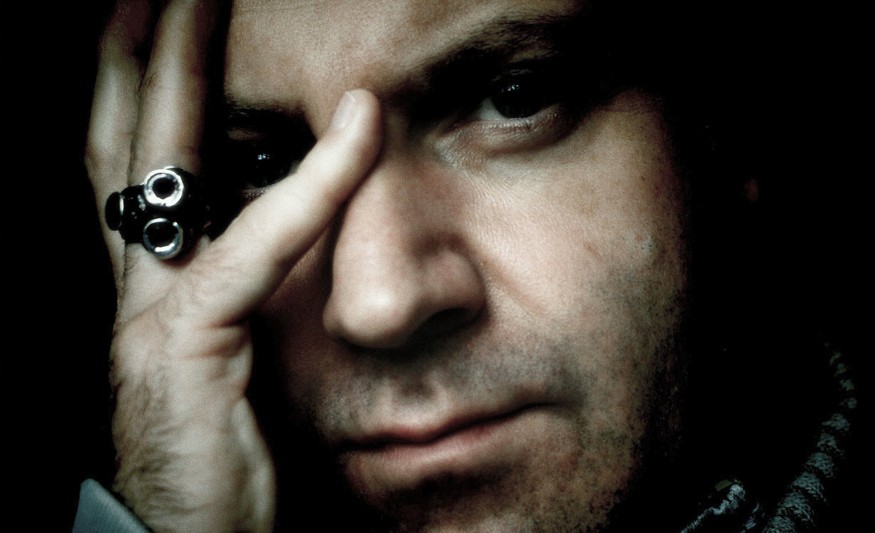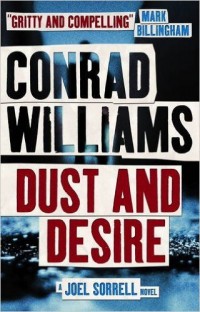
Hailing from Warrington, in the North West of England, Conrad Williams has made a name for himself in the areas of horror and dark fantasy. While his latest novel retains the dark, instead of fantasy Dust and Desire is the author’s first stab at detective fiction. It’s a thriller that benefits from a brilliantly smart-mouthed protagonist in the form of Joel Sorrell, and a story that’s split between London and Liverpool but has a wonderful sense of place. And let’s not forget, one of the scariest serial killers in crime fiction. We asked Conrad to stop by for a chat…
How did you get into writing?
I’ve wanted to be a writer since I was at school. I sold my first short story at 18. Well, I say ‘sold’… I received two free copies of the magazine by way of payment. I took an MA in creative writing at Lancaster University and my first novel published in 1998. Six more since then, plus a hundred stories, give or take. Mainly horror fiction.
What’s Dust and Desire all about?
Joel Sorrell is a damaged guy trying to rebuild his life after his wife was murdered and his teenage daughter ran away from home. He has a weakness for missing persons, and can’t refuse a mayday. But he gets more than he bargained for when he agrees to help out a woman trying to find her brother. It all stems from something that happened in Joel’s past.

What made you decide to write crime fiction?
I’ve always wanted to write a book about a ‘lone wolf’, a rogue element who gets results but doesn’t do things by the rules. I’d written a short story containing such a character that became the blueprint for this larger work. I hope readers find it tense, chilling, disturbing, but also funny too. The strange thing is, I don’t consider it to be any different to the stuff I usually write. Crime is horror. The only real difference is that there’s no supernatural element in play.
The PI mystery is a particularly well established sub-genre of crime. Are there particular writers or fictional characters that you enjoyed and learnt from?
I took my bearings from characters in both literature and film. On the page I’m a fan of Chandler’s Marlowe and Derek Raymond’s anonymous Detective Sergeant. James Lee Burke’s Dave Robicheaux, James Sallis’ Lew Griffin. On screen I was influenced by Jack Nicholson’s portrayal of Jake Gittes in Chinatown, Bogart’s Sam Spade in The Maltese Falcon, Harrison Ford as Deckard in Blade Runner and I’d throw The Conversation’s Harry Caul, played by Gene Hackman, into the mix.
The North West London setting almost becomes another character in the book. Was that something you set out to achieve or did it happen naturally?
I’m glad you think so. I argue much the same point with my creative writing students. Location can become its own character. And yes, I definitely wanted to make the city (whether London or Liverpool) an important part of things. Much of the atmosphere and tension is derived from the surroundings; it’s why I chose to stage the final confrontation where I did.
Wire, your killer, is one of the most frightening creations we’ve seen in a while. How did you get the idea for him, and how did you develop him from child to psychopath?
Obviously the serial killer has been done to death in the genre so the challenge is to come up with some new slant without pushing the boundaries of credibility too far. I knew that a teenage killer might be a little far-fetched, so I had to do something to him in order to bring him into the realms of authenticity. I thought if I pushed him to be the best he could be athletically, then it would be easier to swallow when he goes on his killing spree. So I had him in the gym and it wasn’t much of a leap to have him interacting with villains in that location, which gives him his first opportunity and gets him on the ladder. Character and plot shaped each other in that instance. He had to be dedicated, single-minded, utterly ruthless. His upbringing provided the blinkers.
There’s already news of more Joel Sorrell novels. Can you tell us more about Sonata of the Dead?
Sonata for the Dead is about a militant writers group who are targeted by a killer. Joel goes undercover to infiltrate them when he learns that his daughter, Sarah is a member and likely to be next on the killer’s list. That is scheduled for spring 2016. Then Hell is Empty is to be published in November of the same year. I’ve also edited an anthology of short stories for Titan Books called Dead Letters, which deals with the theme of lost or returned post. A good roster of talent in that including established names such as China Miéville, Joanne Harris, Muriel Gray and new talent such as Maria Dhavana Headley, Steven Hall and Claire Dean.
Read our review of Dust and Desire here, and for more top serial killers, click here.









